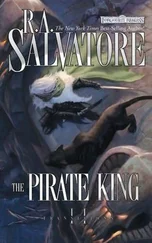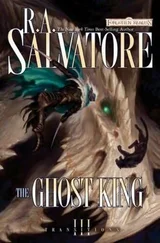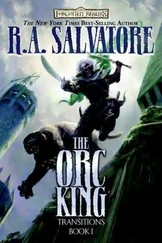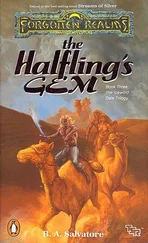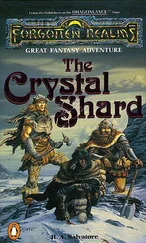Robert Salvatore - The Spine of the World
Здесь есть возможность читать онлайн «Robert Salvatore - The Spine of the World» весь текст электронной книги совершенно бесплатно (целиком полную версию без сокращений). В некоторых случаях можно слушать аудио, скачать через торрент в формате fb2 и присутствует краткое содержание. Жанр: Фэнтези, на английском языке. Описание произведения, (предисловие) а так же отзывы посетителей доступны на портале библиотеки ЛибКат.
- Название:The Spine of the World
- Автор:
- Жанр:
- Год:неизвестен
- ISBN:нет данных
- Рейтинг книги:4 / 5. Голосов: 1
-
Избранное:Добавить в избранное
- Отзывы:
-
Ваша оценка:
- 80
- 1
- 2
- 3
- 4
- 5
The Spine of the World: краткое содержание, описание и аннотация
Предлагаем к чтению аннотацию, описание, краткое содержание или предисловие (зависит от того, что написал сам автор книги «The Spine of the World»). Если вы не нашли необходимую информацию о книге — напишите в комментариях, мы постараемся отыскать её.
The Spine of the World — читать онлайн бесплатно полную книгу (весь текст) целиком
Ниже представлен текст книги, разбитый по страницам. Система сохранения места последней прочитанной страницы, позволяет с удобством читать онлайн бесплатно книгу «The Spine of the World», без необходимости каждый раз заново искать на чём Вы остановились. Поставьте закладку, и сможете в любой момент перейти на страницу, на которой закончили чтение.
Интервал:
Закладка:
To their surprise, though, the guards did not leave them there, escorting them all the way to the city's eastern gate.
"Get out, and don't come back," one of them said as the gates slammed closed behind them.
"Why would I want to return to your wretched city?" Morik cried, making several lewd and insulting gestures at those soldiers staring down from the wall.
One lifted a crossbow and leveled it Morik's way. "Looky," he said. "The little rat's already trying to sneak back in."
Morik knew that it was time to leave, and in a hurry. He turned and started to do just that, then looked back to see the soldier, a wary look upon the man's grizzled face, quickly lower the bow. When Morik looked back, he understood, for Captain Deudermont and his wizard sidekick were fast approaching.
For a moment, it occurred to Morik that Deudermont might have saved them from Jharkheld only because he desired to exact a punishment of his own. That fear was short-lived, for the man strode right up to Wulfgar, staring hard but making no threatening moves. Wulfgar met his stare, neither blinking nor flinching.
"Did you speak truly?" Deudermont asked.
Wulfgar snorted, and it was obvious it was all the response the captain would get.
"What has happened to Wulfgar, son of Beornegar?" Deudermont said quietly. Wulfgar turned to go, but the captain rushed around to stand before him. "You owe me this, at least," he said.
"I owe you nothing," Wulfgar replied.
Deudermont considered the response for just a moment, and Morik recognized that the seaman was trying to see things from Wulfgar's point of view.
"Agreed," the captain said, and Robillard huffed in displeasure. "You claimed your innocence. In that case, you owe nothing to me, for I did nothing but what was right. Hear me out of past friendship."
Wulfgar eyed him coldly but made no immediate move to walk away.
"I don't know what has caused your fall, my friend, what has led you away from companions like Drizzt Do'Urden and Catti-brie, and your adoptive father, Bruenor, who took you in and taught you the ways of the world," the captain said. "I only pray that those three and the halfling are safe and well."
Deudermont paused, but Wulfgar said nothing.
"There is no lasting relief in a bottle, my friend," the captain said, "and no heroism in defending a tavern from its customary patrons. Why would you surrender the world you knew for this?"
Having heard enough, Wulfgar started to walk away. When the captain stepped in front of him again, the big man just pushed on by without slowing, with Morik scrambling to keep up.
"I offer you passage," Deudermont unexpectedly (even to Deudermont) called after him.
"Captain!" Robillard protested, but Deudermont brushed him away and scrambled after Wulfgar and Morik.
"Come with me to Sea Sprite ," Deudermont said. "Together we shall hunt pirates and secure the Sword Coast for honest sailors. You will find your true self out there, I promise!"
"I would hear only your definition of me," Wulfgar clarified, spinning back and hushing Morik, who seemed quite enthralled by the offer, "and that's one I don't care to hear." Wulfgar turned and started away.
Jaw hanging open, Morik watched him go. By the time he turned back, Deudermont had likewise retreated into the city. Robillard, though, held his ground and his sour expression.
"Might I?" Morik started to ask, walking toward the wizard.
"Be gone and be fast about it, rogue," Robillard warned. "Else you will become a stain on the ground, awaiting the next rain to wash you away."
Clever Morik, the ultimate survivor, who hated wizards, didn't have to be told twice.
Part 3 A WILD LAND MADE WILDER
The course of events in my life have often made me examine the nature of good and evil. I have witnessed the purest forms of both repeatedly, particularly evil. The totality of my early life was spent living among it, a wickedness so thick in the air that it choked me and forced me away.
Only recently, as my reputation has begun to gain me some acceptance among the human populations-a tolerance, at least, if not a welcome-have I come to witness a more complex version of what I observed in Menzoberranzan, a shade of gray varying in lightness and darkness. So many humans, it seems, a vast majority, have within their makeup a dark side, a hunger for the macabre, and the ability to dispassionately dismiss the agony of another in the pursuit of the self.
Nowhere is this more evident than in the Prisoner's Carnival at Luskan and other such pretenses of justice. Prisoners, sometimes guilty, sometimes not-it hardly matters-are paraded before the blood-hungry mob, then beaten, tortured, and finally executed in grand fashion. The presiding magistrate works very hard to exact the most exquisite screams of the purest agony; his job is to twist the expressions of those prisoners into the epitome of terror, the ultimate horror reflected in their eyes.
Once, when in Luskan with Captain Deudermont of the Sea Sprite, I ventured to the carnival to witness the «trials» of several pirates we had fished from the sea after sinking their ship. Witnessing the spectacle of a thousand people crammed around a grand stage, yelling and squealing with delight as these miserable pirates were literally cut into pieces, almost made me walk away from Deudermont's ship, almost made me forego a life as a pirate hunter and retreat to the solitude of the forest or the mountains.
Of course, Catti-brie was there to remind me of the truth of it, to point out that these same pirates often exacted equal tortures upon innocent prisoners. While she admitted that such a truth did not justify the Prisoner's Carnival-Catti-brie was so horrified by the mere thought of the place that she would not go anywhere near it-she argued that such treatment of pirates was preferable to allowing them free run of the high seas.
But why? Why any of it?
The question has bothered me for all these years, and in seeking its answer I have come to explore yet another facet of these incredibly complex creatures called humans. Why would common, otherwise decent folk, descend to such a level as the spectacle of Prisoner's Carnival? Why would some of the Sea Sprite's own crew, men and women I knew to be honorable and decent, take pleasure in viewing such a macabre display of torture?
The answer, perhaps (if there is a more complicated answer than the nature of evil itself), lies in an examination of the attitudes of other races. Among the goodly races, humans alone «celebrate» the executions and torments of prisoners. Halfling societies would have no part of such a display-halfling prisoners have been known to die of overeating. Nor would dwarves, as aggressive as they can be. In dwarven society, prisoners are dealt with efficiently and tidily, without spectacle and out of public view. A murderer among dwarves would be dealt a single blow to the neck. Never did I see any elves at Prisoner's Carnival, except on one occasion when a pair ventured by, then quickly left, obviously disgusted. My understanding is that in gnome society there are no executions, just a lifetime of imprisonment in an elaborate cell.
So why humans? What is it about the emotional construct of the human being that brings about such a spectacle as Prisoner's Carnival? Evil? I think that too simple an answer.
Dark elves relish torture-how well I know! — and their actions are, indeed, based on sadism and evil, and an insatiable desire to satisfy the demonic hunger of the spider queen, but with humans, as with everything about humans, the answer becomes a bit more complex. Surely there is a measure of sadism involved, particularly on the part of the presiding magistrate and his torturer assistants, but for the common folk, the powerless paupers cheering in the audience, I believe their joy stems from three sources.
Читать дальшеИнтервал:
Закладка:
Похожие книги на «The Spine of the World»
Представляем Вашему вниманию похожие книги на «The Spine of the World» списком для выбора. Мы отобрали схожую по названию и смыслу литературу в надежде предоставить читателям больше вариантов отыскать новые, интересные, ещё непрочитанные произведения.
Обсуждение, отзывы о книге «The Spine of the World» и просто собственные мнения читателей. Оставьте ваши комментарии, напишите, что Вы думаете о произведении, его смысле или главных героях. Укажите что конкретно понравилось, а что нет, и почему Вы так считаете.



